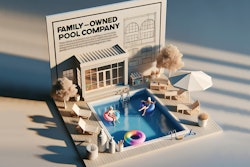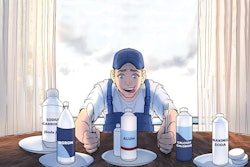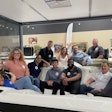
Whether you're an independent service technician or CEO of a major manufacturer, whether you sell to directly to the consumer or to the trade, it hurts to see customers leave. Because staying in business largely means retaining the business you’ve fought so hard to win, understanding why your customers decide to take their patronage elsewhere is critical, if not at times a little painful.
When customers say goodbye in the pool and spa industry, there are plenty of reasons to assign the blame somewhere outside your company. There’s online buying and the scourge of the brick-and mortar retail store. There’s the invasion of massive box stores. There are consumers who shop purely on price and companies willing to compromise the end product to sell at a lower price point. There’s competition from other industries such as RVs, boats and vacations. There are competing products and features that might better fit the customer’s needs. And there’s basic dissatisfaction with the product or service, be it justified or not. Throw in natural customer attrition and shifting market trends and you’ve got a bunch of reasons to account for lost business.
Of course, it’s human nature to avoid having to look too closely in the mirror when searching for answers to negative experiences. But when it comes to watching your customer walk away, the real answers do, indeed, mostly reflect upon ourselves.
THE BIG REVEAL
Here’s the hard truth: The main reason customers leave is indifference. And to be clear, that’s not indifference on their part, but on ours. In all my many years in business, I found that most of the time, it’s not about price, product features, delivery time or even warranty policies. No, it’s about the negative feeling of indifference the customer gets from the seller. Whether we realize it or not, leaving one supplier/vendor for another is almost always an emotional decision.
There are numerous, widely available studies, stats and opinions that support the importance of emotions in buying decisions. Almost all of those sources consistently break down the reasons for customer attrition along the same margins: 68 percent will leave because they do not believe they are valued. All the other reasons, such as those listed above, make up the remainder. Think about that: More than two-thirds of erstwhile customers decide to leave based on their perception of how they’ve been undervalued. It’s not price, it’s not product quality, features or even reputation, it’s that they’ve simply perceived the bitter chill of indifference.
In the past, I’ve talked and written quite a lot about the “experience factor,” that what we’re selling is a specific type of positive experience — the ride instead of the spark plugs, fuel pump or engine, so to speak. In a different context, the feelings customers harbor during the buying process is also a crucial facet of their experience.
RELATED: What Customers Look for Before Hiring Pool Companies
It’s interesting that when you focus on selling the experience, the joy — of owning a pool or spa, in the case of our industry — it reflects in the way you relate to existing and prospective customers. I began my career in the industry selling automatic pool cleaners for the visionary Howard Arneson. He was ahead of his time in many ways, especially when he drove home the point that I wasn’t selling the automatic pool cleaner — I was selling a clean pool.
As simple as it sounds, that distinction changes everything. When you look at sales and customer service from the experiential perspective, it naturally prompts you to think about the experience they have doing business with you. That’s particularly true in our industry, which is ultimately all about making people happy and improving their lives. The buying process should by definition be aimed at reinforcing those positive feelings.
And while that’s obviously true where consumers are concerned, it also applies to selling to professionals. Dealers also make decisions based on the feelings of respect, value and engagement. It’s manifested somewhat differently, but the fundamental psychology remains the same. Consider what happens at distributor outlets, where the person working the counter can become a valued collaborator and problem solver. When that person takes the time to locate a part that’s hard to find, or offer an alternative suggestion how to address a technical problem, the process is no longer a matter of buying and selling. Instead, it’s about the value of that relationship.
The same thing is true of manufacturers. If you have stellar customer service, technical support and programs that reflect an understanding of customer challenges and priorities, people will remain loyal regardless of price. It works on all levels of society because ultimately, humans are first and foremost creatures of emotion.
This is why, for example, receptionists are so important. Their voices and faces are the first things customers experience. As a result, they dramatically influence those all-important lasting first impressions. The same thing goes for retail floor salespeople. When you walk into a hot tub retailer, for example, you remember the way a salesperson makes you feel far more so than the specific features of the portable hot tub you’re considering.
PERSONAL PARLANCE
These days we hear a lot about “transactional” and “relational” buyers. Customers tend to fall into one category or the other. But on the sellers’ side of the equation, we should always strive to develop relationships, listen, do our best to understand the customer’s needs and priorities and to, in a word, care. Almost everybody wants to feel wanted. And when you think of selling in terms of experience and relationships, you might be surprised how the dreaded transactional buyer changes to one who values your relationship. When that happens, they will stay on board regardless of price.
RELATED: If You Want To Last, Put The Customer First
There are near endless examples in the broader business world of how relationships and experience impact success or failure. One of my favorite examples is Nordstrom, probably the most expensive department store in the U.S. market and also the one with the greatest emphasis on relationships and customer service. I love this quote from the company’s former president, Bruce Nordstrom: “We can hire nice people and teach them to sell, but we can’t hire salespeople and teach them to be nice.”
That sounds so prosaic, but it cuts to the heart of the matter. Relationships matter. Being upbeat and kind-hearted matters. And truly caring about the customer’s experience matters.
OPEN EARS & OPEN HEARTS
I’ll end this discussion with a final point. The way you develop lasting relationships with customers largely boils down to one word: listening!
Nothing says you value the customer more than listening to what they have to say. That doesn’t mean listening for the purpose of formulating an immediate response, which is what most people do much of the time in all walks of life, but instead taking the time to open your ears and mind to better understand their perspective.
Active listening has the dual benefits of almost immediate relationship building, and the information you gain directly informs how you address the customer’s needs, desires or even problems. It’s the ultimate win-win. There is absolutely everything to gain by simply remembering to listen. Listening and responding based on what you’ve heard obliterates any feeling of indifference.
That’s how you develop business and how you keep it! The rest is just details.







































